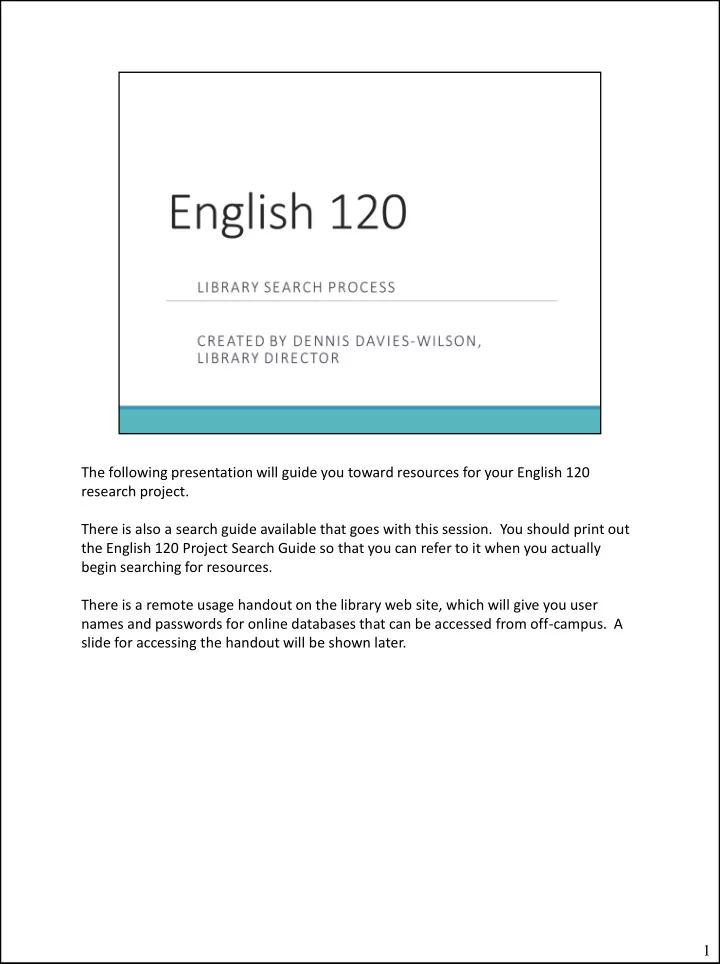

The following presentation will guide you toward resources for your English 120 research project. There is also a search guide available that goes with this session. You should print out the English 120 Project Search Guide so that you can refer to it when you actually begin searching for resources. There is a remote usage handout on the library web site, which will give you user names and passwords for online databases that can be accessed from off-campus. A slide for accessing the handout will be shown later. 1
The search process for this project includes finding book resources by searching in LIBROS , finding articles in online periodical index databases, and finding web resources. 2
3
Just to review, LIBROS is the online catalog, and it should be used especially to find book resources. Those of you who took English 101 at UNM-Los Alamos, will have completed a tutorial on LIBROS , so this should all be somewhat familiar. Also, as a reminder, LIBROS is a consortium catalog shared by all of the libraries in the entire UNM system, as well as many other academic libraries throughout the state, so if you cannot find what you need at the Los Alamos branch library, you may be able to find it at another consortium library and request it through interlibrary loan. The following covers searching for materials in just the Los Alamos portion of LIBROS. • Perform a ‘keyword’ search in LIBROS using terms appropriate to your topic. Some search examples and suggestions are listed on the “Search Guide” handout. If you remember from English 101, a keyword search helps you find information “ABOUT” something. • After you have typed in your search terms, be sure to select UNM-Los Alamos from the pull down menu, in order to see what is available locally. • Once you have identified potential sources in LIBROS , find them on the shelves and then evaluate them for relevance. The quickest way to do this is to browse the table of contents and the indexes for information related to the focus of your topic. • If some of the choices in the results are electronic books, you may access them and view them online. You will be prompted to enter your UNM net ID and password. To evaluate electronic books, you would do the same as you would for a physical book and browse the tables of contents and indexes for relevant information. 4
In the event that you cannot find any useful book resources at UNM-Los Alamos, then, again, it may be possible to obtain other available resources from another library, through interlibrary loan. To find out if there are other useful sources in another library in the LIBROS system, perform the same search as before, except this time, select “ Entire LIBROS Consortium ” from the pull -down menu. Given that more libraries will be included in this search, you may end up with too many possibilities. If that is the case, you may want to add a term or terms to your search that are relevant to your particular focus. If you find books in another library that you would like to use, print out the catalog record; fill out and submit an online interlibrary loan form. (The steps for accessing the online interlibrary loan form is on the next slide). Keep in mind that items borrowed through interlibrary loan can take a week or more to arrive; therefore, please submit your requests in a timely manner. 5
6
Periodical articles are one of the most important source types you will need for this project. To find periodical articles, you will need to search in one or more periodical index databases that we have available. Two such databases are listed here. Both are listed under Frequently used Databases on the library web site front page. For Academic Search Complete , you will be prompted to enter your UNM net ID and password. Those of you who took English 101 at UNM-Los Alamos will recall that you completed tutorials for both of these. 7
Perform appropriate keyword searches on your topic. There are several periodical index databases search examples on the search guide handout for you to refer to. Be sure to select “full text only” and “scholarly/peer - reviewed or refereed” limiting options before you submit your searches. If you choose to search in Expanded Academic ASAP , there will be designators of types of articles indicated in the citation box on the results pages. Articles identified as ‘critical essays’ and ‘articles’ are likely to be the most relevant in the context of this project. Avoid articles designated as a type of review. You may, however, use a book review as a way of finding more books relevant to your topic. The book review itself, though, would not be useful as one of your cited articles.” And of course, select and print desired articles. 8
9
If you are in need of a web resource, search Yahoo, Google, or any other web search engine you are familiar with. Enter appropriate search terms for your topic. Remember that all web resources must be thoroughly evaluated for authoritativeness, reliability, and relevance. • .edu and .org web sites are likely to be easier to evaluate, as they are likely to be authoritative to begin with. .com web sites require thorough evaluation. And finally, if you need to use a web resource, check with your instructor to see how many are allowed. 10
In conclusion, get started on this process right away. Don’t procrastinate! If you do a little bit each day, it won’t be so overwhelming, and by the time you’re done with the paper, you will realize that it was actually pretty easy. If you run into problems or need help, be sure to ask your instructor and the library staff before things reach a state of crisis. 11
Recommend
More recommend